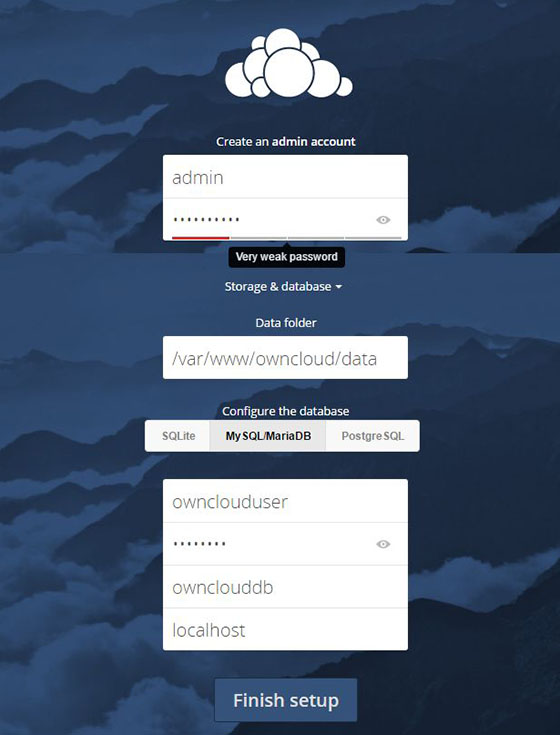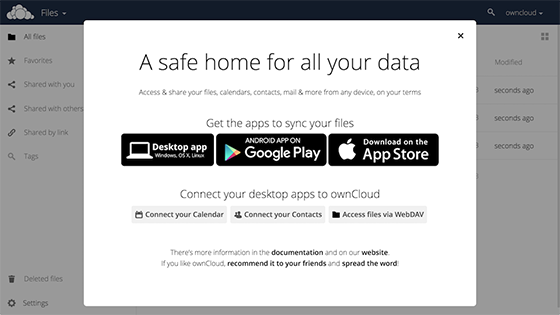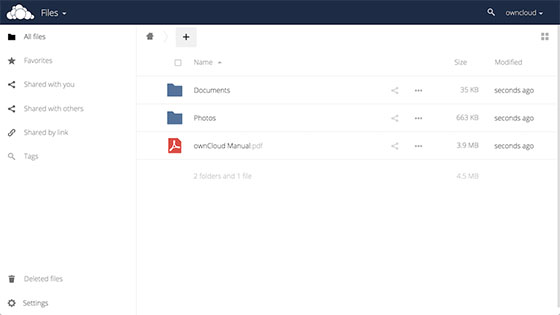
In this tutorial, we will show you how to install OwnCloud on Ubuntu 20.04 LTS. For those of you who didn’t know, OwnCloud is free and open-source software that enables you to create a private “file-hosting” cloud. OwnCloud is similar to DropBox service with the difference of being free to download and install on your private server. Owncloud is made by PHP and backend database MySQL (MariaDB), SQLLite, or PostgreSQL. OwnCloud also enables you to easily view and sync address books, calendar events, tasks, and bookmarks. You can access it via the good-looking and easy-to-use web interface or install the OwnCloud client on your Desktop or Laptop machine (supports Linux, Windows, and macOS).
This article assumes you have at least basic knowledge of Linux, know how to use the shell, and most importantly, you host your site on your own VPS. The installation is quite simple and assumes you are running in the root account, if not you may need to add ‘sudo‘ to the commands to get root privileges. I will show you the step-by-step installation of OwnCloud on Ubuntu 20.04 (Focal Fossa). You can follow the same instructions for Ubuntu 18.04, 16.04, and any other Debian-based distribution like Linux Mint.
Prerequisites
- A server running one of the following operating systems: Ubuntu 20.04, 18.04, and any other Debian-based distribution like Linux Mint or elementary OS.
- It’s recommended that you use a fresh OS install to prevent any potential issues.
- SSH access to the server (or just open Terminal if you’re on a desktop).
- A
non-root sudo useror access to theroot user. We recommend acting as anon-root sudo user, however, as you can harm your system if you’re not careful when acting as the root.
Install OwnCloud on Ubuntu 20.04 LTS Focal Fossa
Step 1. First, make sure that all your system packages are up-to-date by running the following apt commands in the terminal.
sudo apt update sudo apt upgrade
Step 2. Install the LAMP stack.
A Ubuntu 20.04 LAMP server is required. If you do not have LAMP installed, you can follow our guide here.
Step 3. Installing OwnCloud on Ubuntu 20.04.
Now we download the latest version of OwnCloud from the official page:
wget https://download.owncloud.org/community/owncloud-complete-20200731.zip
Unpack the OwnCloud archive to the document root directory on your server:
sudo unzip owncloud-complete-20200731.zip -d /var/www/html/
We will need to change some folders permissions:
sudo chown -R www-data:www-data /var/www/html/owncloud/ sudo chown -R 755 /var/www/html/owncloud/
Step 4. Configuring MariaDB for OwnCloud.
By default, MariaDB is not hardened. You can secure MariaDB using the mysql_secure_installation script. you should read and below each step carefully which will set a root password, remove anonymous users, disallow remote root login, and remove the test database and access to secure MariaDB:
mysql_secure_installation
Configure it like this:
- Set root password? [Y/n] y - Remove anonymous users? [Y/n] y - Disallow root login remotely? [Y/n] y - Remove test database and access to it? [Y/n] y - Reload privilege tables now? [Y/n] y
Next, we will need to log in to the MariaDB console and create a database for the OwnCloud. Run the following command:
mysql -u root -p
This will prompt you for a password, so enter your MariaDB root password and hit Enter. Once you are logged in to your database server you need to create a database for OwnCloud installation:
CREATE DATABASE ownclouddb; CREATE USER 'ownclouduser'@'localhost' IDENTIFIED BY 'YOURPASSWORD'; GRANT ALL ON ownclouddb.* TO 'ownclouduser'@'localhost'; FLUSH PRIVILEGES; exit
Step 5. Configuring Apache web server for OwnCloud.
Create a new virtual host directive in Apache. For example, create a new Apache configuration file named ‘owncloud.conf’ on your virtual server:
ln -s /etc/apache2/sites-available/owncloud.conf /etc/apache2/sites-enabled/owncloud.conf nano /etc/apache2/sites-available/owncloud.conf
Add the following lines:
<VirtualHost *:80> ServerAdmin admin@yourdomain.com DocumentRoot /var/www/html/owncloud/ ServerName your-domain.com ServerAlias www.your-domain.com <Directory /var/www/html/owncloud/> Options FollowSymLinks AllowOverride All Order allow,deny allow from all </Directory> ErrorLog /var/log/apache2/your-domain.com-error_log CustomLog /var/log/apache2/your-domain.com-access_log common </VirtualHost>
Now, we can restart the Apache webserver so that the changes take place:
sudo a2ensite owncloud.conf sudo a2enmod rewrite sudo systemctl restart apache2
Step 6. Set up HTTPS.
We should enable a secure HTTPS connection on Nextcloud. We can obtain a free TLS certificate from Let’s Encrypt. Install Let’s Encrypt client (certbot) from Ubuntu 20.04 repository:
sudo apt install certbot python3-certbot-apache
Next, run the following command to obtain a free TLS certificate using the Apache plugin:
sudo certbot --apache --agree-tos --redirect --staple-ocsp --email you@example.com -d example.com
If the test is successful, reload Apache for the change to take effect:
sudo apache2ctl -t sudo systemctl reload apache2
Step 7. Accessing the OwnCloud Web Interface.
To configure ownCloud, we will use the web interface. So, go ahead and open up a web browser and point it to https://your-domain.com. You should see a web page like this. Enter username and password for the administrator user account, click on the ‘Advanced options’ hyperlink and enter the data directory (or leave the default setting), then enter database username, database password, database name, host (localhost), and click ‘Finish setup’.

Alternately you can also download the ownCloud clients to sync the documents across your devices.

The home page will look like below; you can start uploading the contents using the “+ sign” button.

Congratulations! You have successfully installed OwnCloud. Thanks for using this tutorial for installing OwnCloud on Ubuntu 20.04 LTS Focal Fossa system. For additional help or useful information, we recommend you check the official OwnCloud website.